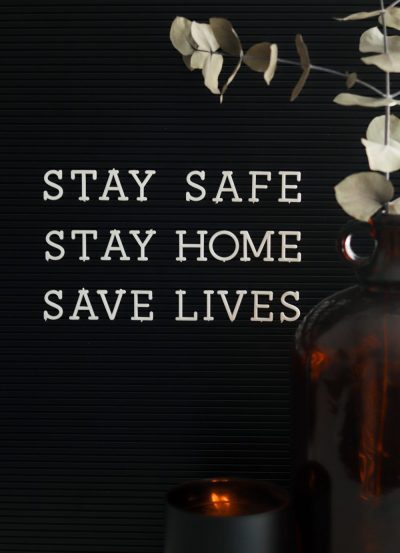
Guest post by Fadziso Fadzisai Mawunganidze. Photo by Sandie Clarke on Unsplash.
Content warning: Contains references to sexual violence, including child sexual abuse.
Imagine a young girl staying with her rapist for 24 hours a day, without the freedom she used to enjoy when she went to school or played with her friends. In addition she is afraid to share what has been happening for fear of being thrown out of her home. What will happen to those girls and women who are raped by their fathers or relatives? Will they report to any family member, police or health facility?
Advice to stay at home due to the outbreak of the COVID-19 virus, with businesses, schools and work suspended until further notice, leaves a lot of young women and girls vulnerable to sexual and gender-based violence (GBV).
Zimbabwe faces a shortage of accommodation and many families have resorted to sharing homes. Now imagine the risk when you are advised to stay indoors at home – will the girl child and the woman be respected there?
According to the 2019 Zimbabwe Multiple Indicator Cluster Survey (MICS), at least 10,121 women and girls between the ages of 15 and 49 have experienced sexual violence, with 55.1% of perpetrators being current husbands, partners, and relatives. The survey further highlighted that 39.4% of girls and women have experienced physical violence, with 71.4% perpetrators being the husband or partner. Childline Zimbabwe in 2019 recorded 4,239 cases of children who were sexually abused, the majority by trusted close relatives and family members. Gender-based violence remains a huge problem in Zimbabwe. At least one in every three women has experienced physical violence between the ages of 15 and 49, and 27% percent of women aged 15-19 have experienced sexual violence at some point in their lives. This suggests that in emergencies, women and girls are likely to face more violence as they are restricted from moving from one place to another.
There are many women who have endured abuse every night, and now they are stuck with their abusers for 24 hours with nowhere to turn. Will they escape marital rape? Will they be able to access health services?
Restrictions on movement usually result in an increase in violence. Chikiti (2018) highlighted that sexual violence in homes occurs due to a family environment characterised by physical violence and conflict, poor parent-child relationship and adherence to traditional gender roles.
Those women who sell items so that they can buy food and clothes for their children – how will they survive when they are told to stay indoors? Will they turn to survival sex work or marry off the girl child so that they can have money and food?
COVID-19 will fuel cases of sexual and gender-based violence, some of which may be reported and some of which may not, due to fears of reprisals by the perpetrators or an absence of places to stay for the victims. The government of Zimbabwe has set up only four One-Stop Centres, which are too few, and their services are insufficient for the larger population of Zimbabweans as they are not in the country’s ten provinces. Moreover, it has not provided safe shelters for abused women and girls in most districts; instead, 11 of the shelters in the country are NGO-based and depend on donor funds. There are also liable to be problems when reporting to the Victim Friendly Unit as there are resource constraints which limit officers in carrying out their duties. In some districts police officers do not have fuel or even transport to conduct investigations.
In the 2011 National Baseline Survey on the Life Experiences of Adolescents (NBSLEA) conducted by the Zimbabwe National Statistic Agency (ZimStat), nearly 41% of girls reported that their sexual debut before 18 years was unwanted. According to NBSLEA, only 2.7% received assistance in the form of medical services or legal aid. This is worrying given the plethora of GBV response services provided by government, NGOs and communities. Concentrated efforts are needed to raise awareness and provide health and legal services on issues of GBV in this COVID-19 era of staying at home and indoors.
Government agencies, including the Ministry of Women Affairs, Community, Small and Medium Enterprises Development, Ministry of Health and Child Care and social welfare department, and the Zimbabwe Republic Police Victim Friendly Unit (VFU), along with NGOs and UN agencies, must give higher priority to community awareness raising and support services on SGBV during normal times, to create a more solid community base for SGBV prevention and protection during disasters and disaster recovery.
The government should therefore provide toll-free numbers for victims to call and report cases. Furthermore, VFUs should be given fuel and transport to conduct investigations on gender-based violence during the COVID-19 era.
The government should provide safe homes and shelters for women and girls who are victims of gender-based violence in Zimbabwe. Mwanahamisi Singano pointed out our urgent need to clearly communicate and make available resources to report, control and manage gender-based violence. This issue disproportionately affects women and girls but is frequently – inadequately – dealt with as a private matter due to religious and cultural values. Addressing this needs to be a matter of government priority.
Further Reading
Front Line Defenders (2020) Defending Rights in the Time of COVID-19: WHRDs Tackle Domestic Violence in China
Hume, Tim (2020) France is Putting Domestic Abuse Victims in Hotels During Coronavirus Lockdown, Vice
IWRAW Asia Pacific (2020) COVID-19: Capitalism’s Mask Has Slipped
IWRAW Asia Pacific (2019) When Illegality is the Starting Point: Refugees and Domestic Violence in Malaysia
Owen, Lara (2020) Coronavirus: Five Ways Virus Upheaval is Hitting Women in Asia, BBC
SBS News (2020) Malaysia Apologises for Campaign Urging Women to ‘Stop Nagging’ Their Husbands During COVID-19 Lockdown
Singano, Mwanahamisi (2020) How to Stop Coronavirus Lockdown Leading to an Upsurge in Violence against Women, Oxfam From Poverty to Power
UNICEF/Zimstats (2019) Zimbabwe 2019 Multiple Indicator Cluster Survey (MICS) Findings Report
UN Women (2016) Zimbabwe, Global Database on Violence against Women

